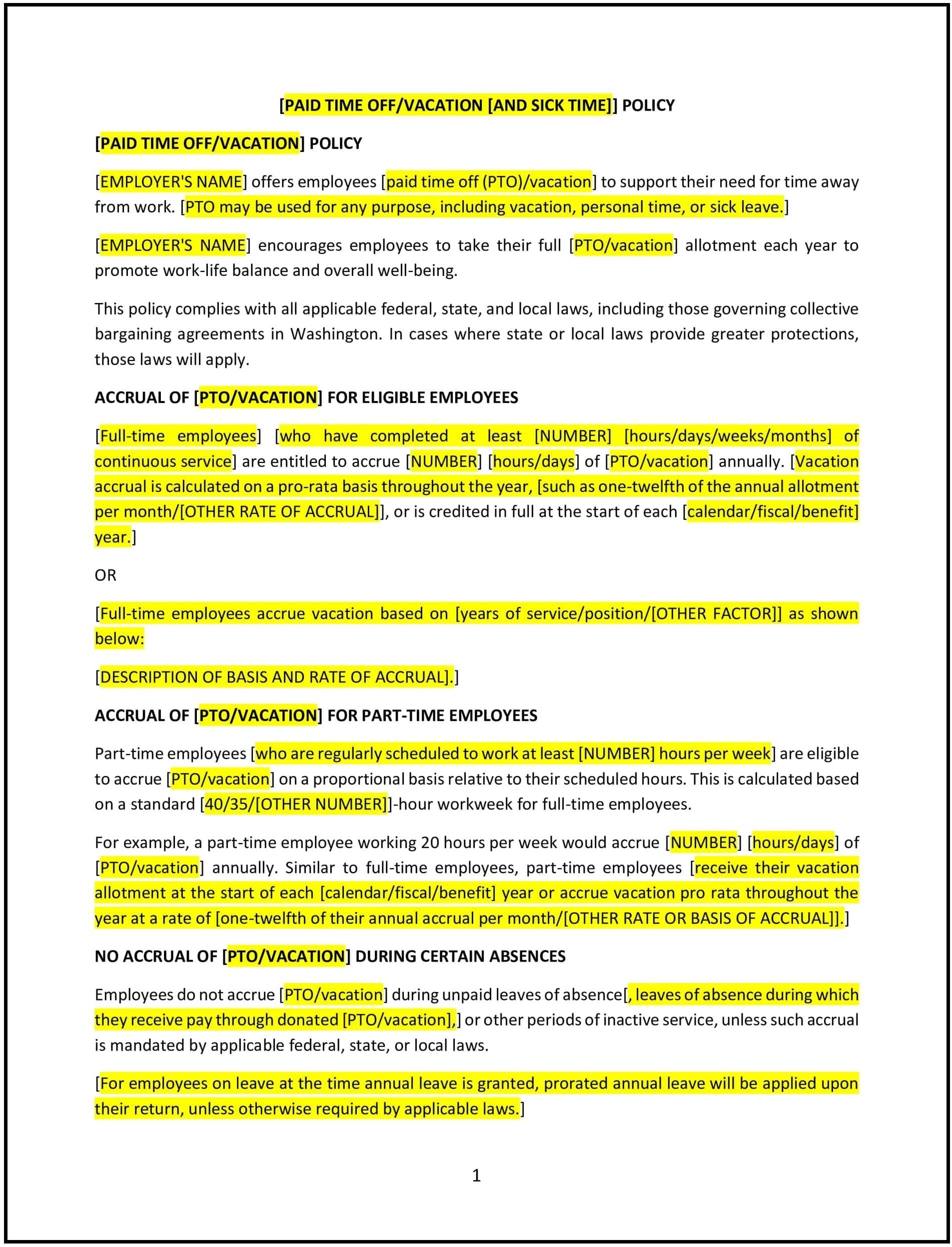Got contracts to review? While you're here for policies, let Cobrief make contract review effortless—start your free review now.

Customize this template for free
This vacation policy is designed to help Washington businesses establish guidelines for vacation leave, ensuring that employees have the time they need to rest and recharge while maintaining business operations. The policy outlines the accrual of vacation time, how employees can request vacation leave, and the company’s expectations for managing time off in a way that supports both employee well-being and business needs.
By adopting this policy, businesses can promote work-life balance, enhance employee satisfaction, and ensure that vacation leave is managed fairly and consistently across the organization.
How to use this vacation policy (Washington)
- Define vacation accrual: The policy should specify how vacation time is accrued, such as by the hour, day, or month, and the rate at which employees earn vacation time. It should also define the total amount of vacation time employees are entitled to, which may vary based on tenure or role.
- Set guidelines for vacation requests: The policy should outline how employees should request vacation time, including the minimum notice period required for submitting vacation requests and the approval process. This ensures that employees’ time-off needs are balanced with business demands.
- Address vacation carryover: The policy should specify whether unused vacation time can be carried over to the next year or if it expires. It should also clarify any limits on carryover time and how the company manages unused vacation balances.
- Specify the process for vacation payouts: The policy should state whether employees will be paid for unused vacation time if they leave the company, either voluntarily or involuntarily. It should clarify the conditions under which vacation payouts are made and how they are calculated.
- Encourage planning ahead: The policy should encourage employees to plan their vacations in advance, particularly during busy times of the year, to ensure that operations are not disrupted. It should also specify how vacation leave requests will be handled during peak business periods.
- Ensure compliance with Washington state laws: The policy should ensure compliance with Washington state laws regarding vacation leave, including laws related to paid sick leave and vacation time accrual. It should also address the treatment of vacation time in the event of illness or other absences.
- Review and update regularly: Periodically review and update the policy to ensure it remains compliant with Washington state laws, federal regulations, and any changes in company operations. Regular updates will help ensure the policy stays relevant and effective.
Benefits of using this vacation policy (Washington)
This policy offers several benefits for Washington businesses:
- Promotes employee well-being: Offering vacation time helps employees manage stress, maintain a healthy work-life balance, and return to work refreshed and more productive. This can lead to higher job satisfaction and morale.
- Reduces employee burnout: By encouraging employees to take regular vacations, businesses can reduce the risk of burnout, increase engagement, and maintain productivity over the long term.
- Improves retention: Employees who feel supported in taking time off are more likely to stay with the company long term. A clear and fair vacation policy helps build loyalty and retention by demonstrating that the company values employee health and well-being.
- Provides clear guidelines: A formal vacation policy establishes clear expectations and processes for both employees and managers, ensuring consistent handling of vacation requests and reducing confusion.
- Promotes legal compliance: The policy helps businesses comply with Washington state laws regarding paid leave, sick time, and vacation accrual, reducing the risk of legal issues related to employee leave.
- Enhances operational planning: By setting clear guidelines for vacation requests and planning, businesses can manage operations more effectively, particularly during peak business periods or when multiple employees request time off.
Tips for using this vacation policy (Washington)
- Communicate the policy clearly: Ensure that all employees are aware of the vacation policy and understand how to request time off, how vacation time is accrued, and any limitations or requirements. Include the policy in the employee handbook and review it during onboarding.
- Encourage early vacation planning: Encourage employees to plan their vacations well in advance, particularly during peak seasons, to ensure smooth business operations. The policy should specify the timeframe for submitting vacation requests.
- Track vacation accruals: Keep accurate records of vacation time accruals and usage to ensure that employees are receiving the correct amount of vacation time and to monitor any carryover balances.
- Be flexible when possible: While the policy sets guidelines for vacation requests, it’s important to be flexible when possible to accommodate employees’ scheduling needs while balancing business requirements.
- Review and update regularly: Periodically review the policy to ensure it remains compliant with Washington state laws, federal regulations, and any changes in the company’s operations. Regular updates will help keep the policy relevant and effective.